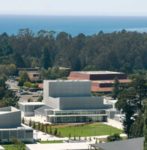New Post IPCC Climate Science: A Darker Frame for our Options and our Future
On April 20 Cabrillo Astronomy Instructor and department chair Richard Nolthenius gave a talk in the Erica Schilling Forum, room 450, on developments in climate science since the last assessment report (AR5) of the International Panel on Climate Change (IPCC) in 2013.
The consensus among climate scientists now is that the report understates the problems in human caused global warming. One reason is that carbon release from permafrost wasn’t included in the report. Another is that some climate forcings were understated or omitted, such as the rate of Greenland surface melt, Antartica ice melt, and greater than predicted risk of methane release.
Another understatement is the ECS – equilibrium climate sensitivity. If the amount of carbon in the atmosphere doubles, the earlier estimate was that this would raise global temperature 2 degrees centigrade – now it appears to be much higher because the effects of amplifying feedbacks (problems that increase themselves) were also underestimated.
The IPCC report is a consensus document agreed on by some with a political agenda, so only the lowest level of alarm gets through.
The report was considered “alarmist” by climate change denialists, but the problem is now worse than predicted by the report.
Politicians have also changed some of the numbers the scientists agreed on.
One of the tragedies is that geo-engineering solutions could at least be tried if the problem were admitted to exist. Politicians deny climate change even after the arctic ice has melted, and are replacing the EPA with climate deniers. This seems like quite a sense of “humor”, but too slapstick for me. I came away from the talk wondering if it would do any good to estimate how many people this action murders. Earlier I thought estimating this was impossible because of chaos theory (“sensitive dependence on initial conditions, or the “butterfly effect”) but was assured that it is just hard, not impossible.
The complete Powerpoint transcript for the talk is at
http://www.cabrillo.edu/~rnolthenius/Apowers/PostIPCC.pdf
The class page for Astro 7 is at https://www.cabrillo.edu/~rnolthenius/astro7/index.html
I recommend this course if you have the time. The web page has material on climate change as well as the politics of climate denialism.
